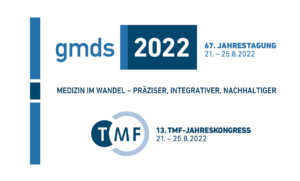The joint annual conference of the Gesellschaft für Medizinische Informatik, Biometrie und Epidemiologie (GMDS) e.V. and the Technologie- und Methodenplattform für die vernetzte medizinische Forschung (TMF) e.V. took place from August 21 to 25, 2022. The GMDS-TMF annual meeting was chaired by Prof. Dr. Björn Bergh (meeting president GMDS) and Prof. Dr. Michael Krawczak (meeting president TMF). Due to the pandemic situation in Kiel, the conference was again held 100% virtually – as already in 2021. This year there was also a live studio, which was set up in the facilities of the Medical Informatics Section in the Hörn Campus Kiel.
The conference was officially opened on Monday morning by Prof. Dr. Bergh, Prof. Dr. Krawczak and Prof. Dr. Björn Schreiweis. This was followed by a greeting from the President of Kiel University, Prof. Dr. Simone Fulda. This was followed by another greeting from the Dean of the Medical Faculty of CAU Kiel, Prof. Dr. Joachim Thiery. In addition, the Chairman of the Board of the University Hospital Schleswig-Holstein (UKSH), Prof. Dr. Jens Scholz, was welcomed to the live studio, who highlighted the importance of hospital digitization. Subsequently, the President of the GMDS, Prof. Dr. Harald Binder, addressed a virtual greeting to the participants. Finally, there was an outlook on the conference.
In line with the motto “Medicine in Transition – More Precise, More Integrative, More Sustainable,” the conference focused on the topics of digitalization, Big Data, artificial intelligence and robotics. In the 23 lecture sessions and 3 tutorials from the fields of medical informatics, biometrics/statistics, epidemiology and public health, an intensive exchange took place among the nearly 500 participants. A total of 98 submitted papers from a broad range of topics were presented in the lecture sessions as well as in the ePoster section and the networking area.
Particularly current topics of broad interest were presented in the form of keynotes. First, Prof. Dr. Michael Höhle (Stockholm University, Sweden) provided insights with his keynote, which focused on the impact of statistical uncertainties in deviations from time series data in algorithm-based approaches. On Tuesday, Dr. Demetris Avraam (Newcastle University, UK) spoke about privacy in data sharing and analysis in medical research. There were also two panels on Tuesday with different experts on health data architecture for care and research and privacy and medical research.
Wednesday continued with two keynotes: Dr. Teresa Zayas Cabán (National Institutes of Health, Maryland, USA) spoke on interoperability in healthcare and research, and Dr. Marianna Cortese (Harvard T.H. Chan School of Public Health, USA) spoke on the role of Epstein-Barr virus in multiple sclerosis. Dr. Rolf Apweiler (European Bioinformatics Institute, UK) spoke on Thursday about the various EMBL-EBI partnerships that support research. In the accompanying live talks, the conference presidents together with other guests delved deeper into the content of the presentations.
On Thursday afternoon, the conference came to a successful close with a summary by Prof. Dr. Bergh, Prof. Dr. Krawczak, Prof. Dr. Schreiweis and the last musical contribution by Yonatan Pandelaki.
The organizers thank all experts for the great insights into their research areas. The reference to current international health policy issues once again impressively underlined the relevance of the topics of GMDS and TMF for medicine in Germany.
Home » Activities » Final Report GMDS-TMF Annual Meeting 2022

Final Report GMDS-TMF Annual Meeting 2022
Current Projects
- 3LGM2IHE (Supporting the Design of Interoperable Information Systems in Clinical Research)
- HiGHmed (Heidelberg-Göttingen-Hannover Medical Informatics)
- IMPETUS
- INTERLINK
- KI-SIGS (KI-Space for Intelligent Healthsystems)
- KULT-SH (Efficient healthcare for children with cancer using telemedicine in Schleswig-Holstein)
- PEPA (Personal Cross-Enterprise Health Record)
- POLAR_MI
- Protect Move
Contact
Kiel University
Institute for Medical Informatics and Statistics
Department for Medical Informatics
University Hospital Schleswig-Holstein
Tel.: +49 (0) 431 - 500 31601
Fax: +49 (0) 431 - 500 31604
Search
Compass Theme Designed And Developed by InkThemes.com
